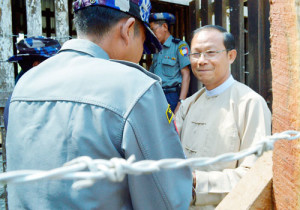By Vani Sathisan, Sanhita Ambast and Reema Omer*
Blasphemy prosecutions are undermining the rule of law in Myanmar, India and Pakistan.

Writer and National League for Democracy information officer Htin Linn Oo (right) arrives at Chaung Oo Township Court in Sagaing Region on March 24. (Than Naing Soe/The Myanmar Times)
Blasphemy laws, such as section 295(a) of these countries’ penal codes, are inconsistent with human rights, including freedom of opinion and expression; freedom of thought, conscience and religion; the right to liberty; and the right to equality before the law without discrimination. They are also applied arbitrarily, and accused people are often punished after unfair trials.
Section 295(a), enacted by colonial authorities in 1927 to curb communal tension, is the same in all three countries. It states that “deliberate and malicious intention of outraging the religious feelings of any class by insulting its religion or religious beliefs” shall be punished with imprisonment, a fine or both.
In a litany of recent cases, however, courts have convicted individuals in the absence of evidence of any deliberate and malicious intent to insult a religion. People have been severely punished simply because their acts of expression without such intent were perceived to be at odds with conservative interpretations of a religion. In Myanmar, at least, statements offensive to minority religions go unpunished.
Earlier this year in Myanmar, Philip Blackwood and his colleagues, Tun Thurein and Htut Ko Ko Lwin, were jailed for two-and-a-half years with hard labour under 295(a) for posting on Facebook a psychedelic image of the Buddha wearing headphones to promote their bar.
More recently, Htin Linn Oo, a writer and National League for Democracy information officer, was sentenced to two years’ imprisonment with hard labour under 295(a). An edited 10-minute video of his two-hour speech at a literary event was posted on social media, outraging some Buddhist groups.
A Buddhist himself, Htin Linn Oo had questioned the Buddhist credentials of those using Buddhism to incite violence.
Ma Ba Tha, an ultra-nationalist movement seeking to “control the spread of Islam” in predominantly Buddhist Myanmar, and other nationalist monks protested outside the court and demanded tougher punishment. The District Court rejected his appeal, reportedly stating it “should not interfere” with the lower court’s decision.
These convictions violate international law, including a range of human rights recognised by the Universal Declaration of Human Rights and by international treaties. Myanmar’s constitution guarantees the right to freedom of expression and conscience, and to freely profess and practice religion. This, together with the absence of proof of intent, makes the convictions difficult to reconcile with Myanmar’s own laws. The convictions are a worrying indicator of growing religious intolerance in the country.
Examples from India demonstrate how the very existence of section 295(a) can chill free speech, even before a case has a chance to reach the courts. Section 295(a) has been used to arrest and charge individuals who express allegedly “outrageous” opinions, even without evidence of intent. Shaheen Dhada and Renu Srinivasan, for example, were originally charged under 295(a) for criticising on Facebook Mumbai’s shut-down following the death of right-wing politician Bal Thackeray. This charge was later modified.
In 2014 Penguin India publishing company decided to withdraw publication and destroy remaining copies of Wendy Doniger’s scholarly work The Hindus: An Alternative History in response to a case filed under section 295(a) by a right-wing religious group accusing the book of hurting Hindu sentiments.
While police may drop such charges at a later stage, section 295(a) has still damaged free expression by enabling the initial harassment.
Pakistan has enacted even broader provisions such as section 295(c) of the Pakistan Penal Code, criminalising words, representations, imputations, innuendos, or insinuations that directly or indirectly lead to “defiling the sacred name of the Holy Prophet”. Courts are even more willing to dispense entirely with proof of intent or any objective standard for what constitutes blasphemy under this section.
The UN Human Rights Committee established by the International Covenant on Civil and Political Rights – a key human rights treaty to which India and Pakistan are parties – has emphasised that “prohibitions of displays of lack of respect for a religion or other belief system, including blasphemy laws, are incompatible with the covenant”.
The only limited exception under the covenant would be for proportionate and non-discriminatory measures to prohibit “advocacy of … religious hatred that constitutes incitement to discrimination, hostility or violence”. Section 295(a) and, in Pakistan, section 295(c) fall far short of this threshold.
The incompatibility of these laws with international human rights, as well as their discriminatory application, renders the proceedings and punishments based upon them arbitrary. The concern is all the more acute when the judicial systems lack independence or impartiality, as the International Commission of Jurists has found to be the case in Myanmar, or where blasphemy trials are grossly unfair and the prescribed punishment is a mandatory death penalty, as in Pakistan.
Those who support prosecutions under the blasphemy laws may honestly believe they are protecting the dignity of their religion, but by violating human rights such prosecutions deny the human dignity of the defendants and undermine the rule of law for all. The laws must be repealed or fundamentally changed, ongoing prosecutions must be ended, and those imprisoned for their beliefs or protected speech immediately and unconditionally released.
Vani Sathisan, Sanhita Ambast and Reema Omer are international legal advisers for Myanmar and South Asia, respectively, for the International Commission of Jurists.
This article was originally published here.
